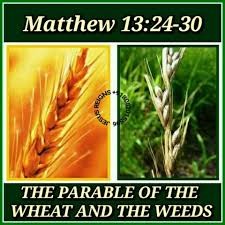Message From the Pulpit – Proper 11 – July 19, 2020
My Brothers and Sisters,
I share with you from a book entitled “the Sunday Readings by Fr. Kenneth OSullivan the Gospel reading for today.
In the longer form of today’s gospel, (Matthew 13:36-43) our Lord added two other short parables which depicted His church as having a very lowly and very small beginning but, in due course becoming a large and world-wide institution. The apostles seemed to have grasped the lesson of the shorter parables, but they asked him to explain the one about the weeds.
This parable is Christ’s answer to the question so frequently asked: Why does God permit evil to triumph so often in this world, why are the wicked allowed to prosper?” The triumph of the wicked is short-lived, the reward of the Christian who suffers from their wickedness is everlasting. The very wickedness and injustics of evil-doers are one of the ways that God uses to perfect his elect. It is only on a battlefield that a true soldier can be proved.
In the parable, the weed does not destroy the wheat. It only makes it more difficult for the wheat to grow to maturity. So it is with the Christian. No one can take his faith from him, but living up to it is made more difficult by the evil influence and bad example of sinners. If some succumb to this evil influence and give up the practice of their faith, the fault is theirs. God can force no man to serve him.
The patience of the farmer in letting the weed grow on until harvest time exemplifies the infinite mercy of God toward sinners. The weed could not change its nature, but the sinner can change his ways and God gives him every chance and every help to do this, up to his last moment of life. No sinner will be excluded from heaven because of the sins he committed but because he did not repent of these sins while he had trhe opportunity.
We must learn a double lesson of patience from this parable. First, to be patient with those who make our spiritual progress more difficult for us-they are actually helping us to be better Christians if we bear with patience, the injuries they inflict on us. Second, we must try to imitate the patience God shows in his dealings with sinners.. While we must not approve of their evil deeds, or their sins, we must still look on them as our bropthers and do all in our power to put them back on the right road to heaven. We can do this by good example, and by ferevent prayer for their conversion. This is not easy for human nature, but we can be certain that God will give us the necessary grace and strength to subdue our natural weakness and aversion, if we try to act with charity and true brotherly interest toward our erring fellowmen.
By acting thus, we will not only be helping a weak brother on the rugged road to heaven, we will also be making doubly sure of our own arrival there, for God will never be outdone in generosity.
Think on these things!

